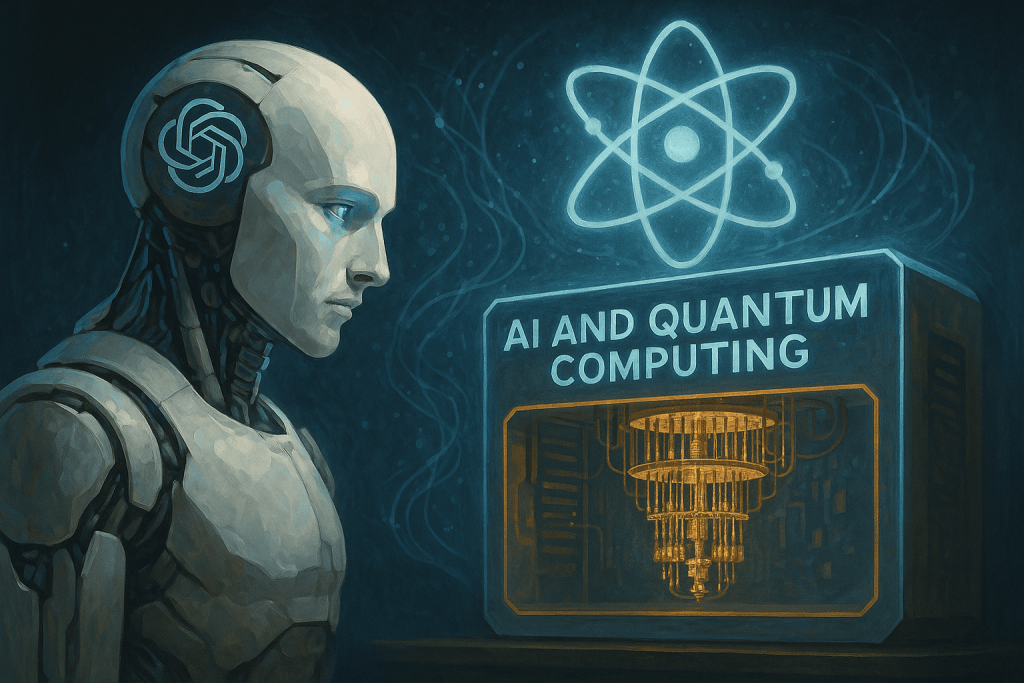In recent years, artificial intelligence (AI) has achieved remarkable advancements, particularly with the development of large language models such as GPT (Generative Pre-trained Transformer). GPT and similar models have revolutionized content creation, conversational AI, and a wide range of data-driven applications. However, the advent of quantum computing promises to dramatically accelerate these advancements, pushing the capabilities of GPT into entirely new territories of possibility and performance.
Quantum computing harnesses the peculiar principles of quantum mechanics—superposition, entanglement, and quantum tunneling—to process information at speeds unattainable by classical computers. When combined with AI and, specifically, GPT models, quantum computing could unlock exponential improvements in processing speed, data handling, and overall intelligence. But what exactly happens when GPT goes quantum, and how will this impact the future of AI?
Quantum Computing: A Brief Overview
Unlike traditional computers, which process information using binary bits (0 or 1), quantum computers use quantum bits, or “qubits.” A qubit can represent both 0 and 1 simultaneously, thanks to the phenomenon known as superposition. This property allows quantum computers to handle multiple calculations in parallel, exponentially increasing processing capacity. Moreover, quantum entanglement—another cornerstone of quantum mechanics—enables instant correlations between qubits, facilitating extremely rapid and complex computations.
These quantum properties provide the foundation for solving complex problems that are currently infeasible for classical computers, such as factoring large numbers, modeling molecular interactions, optimizing intricate logistical processes, and handling vast datasets with unprecedented speed and precision.
Quantum Acceleration for GPT Models
GPT models, like GPT-4, already process enormous datasets, learning linguistic patterns and contextual meanings through billions of parameters. Despite their impressive performance, these models are limited by computational constraints. Training and refining them require massive computational resources and extensive time, often measured in weeks or months. Quantum computing could dramatically shorten these periods, transforming months of processing into mere minutes or even seconds.
The immediate implication is the ability to develop vastly larger and more sophisticated GPT models. Quantum-powered AI could process datasets that are orders of magnitude larger than currently possible, leading to even more nuanced and contextually aware responses. Such advances could significantly improve conversational AI, content generation, real-time language translation, and semantic understanding, achieving near-human or even superhuman comprehension and creativity.
Enhanced Capabilities and New Possibilities
Integrating quantum computing into GPT could revolutionize several fields. In scientific research, quantum-powered GPT models could rapidly interpret massive datasets, accelerating discoveries in medicine, genetics, and material sciences. The speed and precision of quantum-assisted AI could dramatically enhance personalized medicine, allowing instantaneous analysis of genetic data to tailor treatments to individual patients, potentially revolutionizing healthcare practices.
In finance, quantum-enhanced GPT systems could forecast market movements with unprecedented accuracy, factoring in countless variables simultaneously. Risk management and algorithmic trading would benefit significantly from such advancements, improving efficiency and profitability. Similarly, quantum-driven GPT models could transform cybersecurity by quickly identifying and responding to threats, predicting and neutralizing sophisticated cyberattacks with unmatched accuracy.
Challenges and Practical Considerations
Despite the exciting potential, the integration of GPT and quantum computing faces considerable challenges. Quantum computers are currently limited by issues such as qubit stability, error rates, and scalability. Current quantum devices require complex maintenance and highly specialized conditions, often operating at extremely low temperatures. Significant research and engineering breakthroughs are needed before quantum computers become widely accessible and affordable.
Moreover, the development of quantum algorithms optimized specifically for GPT training and execution remains a major hurdle. Current quantum algorithms are mostly tailored for specific mathematical problems, not generalized machine learning tasks. Bridging this gap will require significant interdisciplinary collaboration between quantum computing researchers and AI specialists.
Ethical Implications and Future Considerations
The power of quantum-enhanced GPT models raises important ethical considerations. AI systems of such magnitude could magnify existing risks associated with misinformation, data privacy, and algorithmic biases. The rapid processing of quantum computers could also amplify the spread of deepfakes and other digital manipulation technologies, making distinguishing reality from fabrication increasingly challenging.
Proactive regulation, transparency standards, and ethical guidelines must accompany these technological advancements. Researchers, policymakers, and industry stakeholders must collaborate to ensure responsible development and deployment of quantum-enhanced AI, emphasizing accountability, transparency, and equitable access.
Preparing for the Quantum-AI Future
While fully quantum-enhanced GPT remains a goal for the future, businesses and research institutions must begin preparing today. Investing in quantum computing research, interdisciplinary training, and infrastructure will be crucial to staying competitive in the next technological revolution. Organizations that proactively explore the potential of quantum-driven AI will gain significant advantages, positioning themselves at the forefront of innovation and development.
Educational institutions also have a critical role to play. Incorporating quantum computing and quantum-aware AI concepts into curricula will prepare future generations of researchers, engineers, and decision-makers for the quantum age. Cross-disciplinary knowledge will be essential to harness the full potential of quantum-enhanced GPT technology.
Conclusion
The fusion of AI and quantum computing heralds an exciting and transformative era for technology, business, and society. When GPT models go quantum, the possibilities for innovation, discovery, and problem-solving become virtually limitless. While considerable challenges remain, the potential rewards far outweigh the obstacles, promising to redefine the very fabric of our technological landscape.
Embracing this quantum leap forward requires a combined effort across industries, academia, and governments to ensure ethical, accessible, and responsible development. As quantum computing moves from theory into practice, GPT stands ready to redefine what artificial intelligence can achieve, opening the door to a future more innovative, intelligent, and interconnected than ever before.



quantum ai is wild 🤯! I hope this idea it will work
Nope, not yet, man… 😂
that sound very very hard
lol quantum gpt hype? seems sus 🙄
lol quantum gpt hype seems sus 🤔 but cool tho!
yo GPT + quantum?? 🤯 wild stuff comin fr